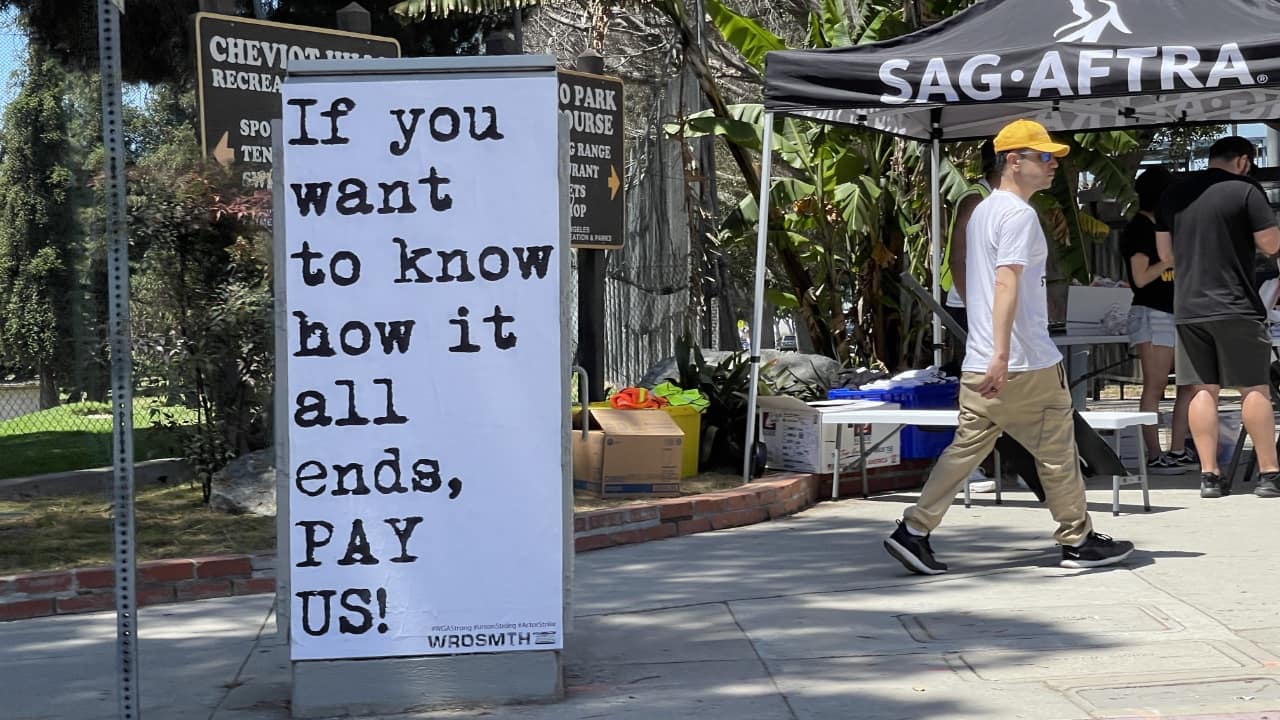
Rakesh Malik checks in from Vancouver, a city where WGA/SAG-AFTRA strike action has seen production grind to a halt and the necessity of earning alternate incomes become a vital topic of conversation.
Most film industry workers who are making a living in film in the US live in film industry hubs such as Vancouver, Atlanta, and LA. There is a lot of opportunity in these towns, and the film unions provide a lot of employment protection as well as salary tiers. While an experienced lamp operator can negotiate a higher rate than the union standard rate, the standard rate is a minimum that the production may pay.
The union employment protection also helps union members. Productions have to hire full union members first, and when they run out of full union members they can start hiring union permittees. If they run out of permittees, then they can hire non-union candidates, provided that they have the required certificates, experience, and training.
All this means that during busy periods there is enough demand for workers that some actually make their living only doing day calls instead of taking full time engagements for the duration of a production, which can range from anywhere from three weeks for small budget films to six or seven months for series. In times like this the small three week shoots are only generally able to afford newbies, because the veterans stick to the high salaries available on the big studio productions.
A lot has changed
Normally in a major industry hub like Vancouver, there are 30+ big films in production and dozens of smaller ones. So far in 2023, there have been so few productions underway that even the small budget Hallmark productions are able to get space in studios that are normally only accessible to big budget productions and rental houses are offering nearly free rentals to independent productions because business is so slow right now. Even post houses are laying off workers because their project queues are running out as they complete projects with barely any new work coming in.
Here in Vancouver there are thousands of union workers who are normally earning good salaries and getting two fully catered meals a day are now struggling to make ends meet as their government unemployment benefits run out, and as leakers from the studios have revealed, the studios are waiting until film industry workers start getting evicted before returning to the negotiating table, making it crystal clear that they have no intention of negotiating in good faith.
Given the ludicrous salaries that the executives receive while writers are barely making ends meet, the only surprise is that the union leadership is surprised by the studio executives' lack of ethics.
So there is the situation. How do we, the film industry workers, survive this?
A lot of people who are struggling to make ends meet as a result of the strikes will change careers entirely and not return to the film industry. Others will stick it out, doing part time work in other fields to make ends meet and continuing to build their film skills, and some will find ways to make their own films. Here's an overview of some of the options.

Adam Sandler and Ben Stiller on the picket line of strike workers of WGA and SAG-AFTRA in front of NBCUniversal headquarters in New York on August 2, 2023. Pic: Shutterstock
Making ends meet
1. Alternative careers
This is easily the most obvious option, though definitely not the easiest. However, many people work their way into film after leaving other fields, and some of those fields are in high demand at the moment such as software development and other IT niches. Reversing course and heading back into them seems a decent option for those with skills that can be updated.
There are also career change options within the film industry that have some skills overlaps with other film jobs, and more importantly network overlaps. Here in Vancouver even though there are very few jobs available in production, the demand for visual effects talent is still hot. Compositing in particular is in high demand, because there are not that many people who can do it well, especially in independent film. By way of example, I have paid several months' rent this year by doing compositing and rotoscoping for independent feature films. The skill set required is quite deep, but the only obstacle to learning compositing is the time and effort required to learn. In independent film there is no need for any subscription software thanks to Black Magic and the Blender Foundation. All that's required is a reasonably powerful personal computer with the OS of your choice and some effort to learn, practice, and network.
The breadth of job opportunities available in the VFX industry is also very large; a lot of the local VFX houses are still recruiting for modellers, animators, lighters and riggers, effects TDs, environment artists, and so on. This is another skill that anyone with a computer and an internet connection can work on thanks to the availability of professional grade software that is free such as Blender, or personal learning editions of software like Maya, Cinema4D, and Houdini. Any niche in computer graphics is a deep rabbit hole, true, but it also opens the door to more job opportunities.
2. Transferable skills
The film industry covers a very wide gamut of skill sets, so nearly everyone in film has skills applicable to other fields. For example, motion picture lighting and live event lighting have a lot in common. Even the training and certificates are very similar, since live event lighting involves the same rigging, electrical, and DMX programming and configuration skills that motion pictures do. Big budget film of course pays quite a bit better, but events can still pay the bills.
Theme parks and holiday themed events such as haunted houses also have similar overlap; Vancouver's Pacific Northwest Entertainment runs a month long haunted house event in October and has been recruiting out of work film industry workers to staff that and other events over the summer.
Many production assistants get a certification called “Traffic Control Person” so that they can control traffic during a production. When construction crews need to control traffic at a construction site on a road they hire people with TCP certifications. Yes, it’s not the career you dreamed of, but food on the table is the main aim here and that certificate can give you the edge.
In the same vein, another career that is usually in high demand anywhere near a big city is construction, and the qualifications for entry level construction are minimal. And while the gig economy is not a great place for the long term, needs must and driving or delivering for rideshare and delivery companies like Uber, Uber Eats, Door Dash, and the like can also serve to pay the bills in the here and now. Perhaps useful to know: while driving for Uber requires a commercial drivers' license, delivering for Uber does not.
To be crystal clear, this is all about survival and solidarity and not being starved out while we wait for the studios to move on the WGA/SAG-AFTRA demands.

No license required at all. Though it's a) rarely this idyllic and b) hardly what any of us got into the creative industries to do. Pic: Shutterstock
3. Create your own career
There are a lot of opportunities in this category. While creating your own career often has the longest startup period, it can also be the most flexible way to go looking down the line.
For example, here are a lot of people making a living by creating videos and distributing them on YouTube, building an audience, and using subscription platforms like Patreon to earn money from them. Most successful YouTubers built their audiences by delivering content to them regularly for long periods of time in order to reach a sustainable enough level to make sharing content on YouTube a full time career. It takes a lot of effort and dedication, but requires very little technical skill and minimal monetary outlay.
Good at writing? Start making a list of publications that solicit work from freelancers, do some research, and start pitching. There is a lot of demand; there are websites dedicated to writing job opportunities such as IAPWE.org. [Anyone reading this and interested in writing for RedShark, get in contact - Ed.]
Making social media content for local businesses can also be a good career. A lot of companies are looking for ways to keep their marketing machines working, but not willing to spend the money for large scale commercial productions, especially local businesses such as restaurants. They are often finding better value for their investment by hiring small production companies, often sole proprietorships. While the compensation is nowhere near that of a commercial production, neither is the overhead.
4. Start an online shop
There are a lot of opportunities in this arena also. Plenty of people sell all sorts of things via platforms such as Shopify and Etsy including things such as photographic prints and, er, cat harnesses and custom cat furniture. There are, in other words, lots of niches.

Put that card away! The idea is to get on the other end of this transaction. Pic: Shutterstock
Of course, selling digital content is also a good option. There is a market for paid tutorial videos, for example; there are a number of YouTube content creators who make tutorial based channels to distribute free tutorials while also promoting paid tutorials. Some like Entagma in the CG space use a subscription model to fund their content creation, making some tutorials available only to paid subscribers.
4. Make your own movies
This is the last section because, while the most desirable for most filmmakers, this is also the hardest for out of work filmmakers to attempt. Most of us will have to seek ways to earn in other fields in order to do this, because most independent films do not include salaries, especially passion projects.
That said, funding one's own film is not the only way to get it made. Many governments offer grants to help industry newcomers, for example the Canadian Council for the Arts and TeleFilm Canada in, as one might surmise, Canada. What grant opportunities are available will of course vary by country, province, state, and so on.
This is not a short term option, and best approached while having another way of covering the bills already sorted out. That said, it can be a winning proposition in the long term, because there are independent production companies and distribution channels that are looking for content. Not only are the big Hollywood studios not the only options available, they are also not actually making much of anything right now thanks to the strikes that they themselves caused.
Some of these independent networks are more than willing to invest some money in content to add to their rosters. Their budgets might be relatively small, but for a film team with low overhead that small budget could be enough to make a good living.
In short: Diversify
There are actually a lot of possibilities. Given the global economic uncertainty these days it would be perhaps wise to consider as many of them as possible.
There is no one best option to recommend for out of work filmmakers, because everyone's situation is different. Someone with a spouse or partner with a full time job has a much better chance at being able to make their own film than someone who is living alone and for whom film was a primary livelihood. Location also makes a big difference; some countries have many grant opportunities and career training bursaries, but others have next to none of either. For those living in or near film industry hubs are also likely to have much easier access to grip and lighting equipment as well as other unemployed talent.
For example, a director here in Vancouver who is financing his film with his savings was able to find a career effects makeup artist to help him with practical effects and a very low cost studio rental because he believes in the project and has free time to help. Another colleague recently crewed on a film school production that was able to get a sizeable collection of rented grip and lighting equipment nearly for nothing because so much rental gear at big rental houses is sitting idle and gathering dust rather than earning money.
On the other hand, for those not living in film industry hubs, the costs for location permits and rentals will likely be a quite a bit lower than in the hub cities, and there are online equipment rental services like BorrowLenses that have very economical rates.
Many of these options can be part time jobs rather than full time, and having a few streams of income is a more resilient strategy than having only one. Write as a freelancer for a journal, teach part time at a film school, and sell crafts or photography via Etsy, get a TCP certification and take gigs in traffic control, and so on.
Final thoughts: Solidarity

What that says. Pic: Shutterstock
Not all of these ideas will apply to everyone, and there are also, of course, other ways to earn money. Location does matter, since opportunities such as grants vary based on government policies, as do education bursaries.
While figuring out how to weather these unprecedented and very stressful but very necessary strikes, keep an eye on the industry goings on. There is a lot at stake; should the writers and actors give in and let the studios have their way, the studios will replace us all with AI.
That is precisely what the studios want, and it is up to us to figure out how to stand up to them so that we can keep working in show business.
Tags: Production


Comments